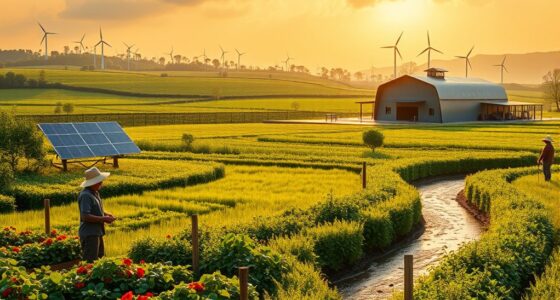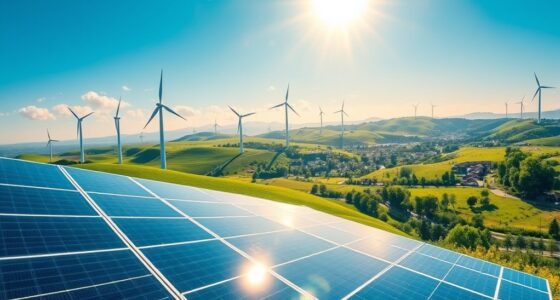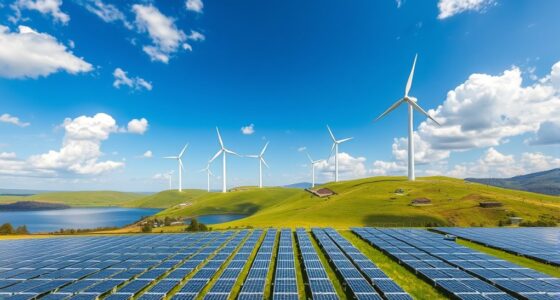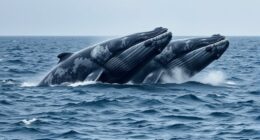While plastic straws and beach cleanups are important, true ocean conservation requires addressing much bigger issues. Climate change, overfishing, and pollution threaten marine life and habitats worldwide. Understanding these complex challenges can help you make more impactful decisions and support effective solutions. As you explore deeper, you’ll discover how protecting ecosystems and advocating for sustainable practices can make a real difference for our oceans’ future.
The Impact of Climate Change on Marine Ecosystems
Climate change is rapidly altering marine ecosystems, and these changes threaten the delicate balance of ocean life. As global temperatures rise, you’ll notice ocean waters warming, which disrupts habitats for many species.
Coral reefs, often called the rainforests of the sea, are bleaching and dying off, losing their vibrant colors and the biodiversity they support. You’ll also see shifts in the distribution of fish and marine mammals, forcing them to migrate to cooler areas, which affects local fisheries and ecosystems.
Increased greenhouse gases lead to ocean acidification, weakening shells and skeletons of marine creatures like mollusks and plankton. These changes ripple through the food chain, impacting species at every level, and threaten the stability of entire marine environments you depend on.
Overfishing: A Threat to Ocean Biodiversity
Overfishing has become one of the most significant threats to ocean biodiversity, as it depletes fish populations faster than they can reproduce. When you overharvest certain species, you disrupt the delicate balance of marine ecosystems, affecting predators, prey, and the entire food chain. This can lead to the collapse of key populations, reducing biodiversity and weakening the resilience of ocean habitats. Overfishing also causes the decline of commercially important fish stocks, threatening livelihoods and food security. The use of sustainable fishing methods and high contrast ratios in monitoring can help manage fish populations more effectively. If you’re concerned about ocean health, supporting sustainable fishing practices is essential. By choosing responsibly sourced seafood and advocating for effective regulations, you help reduce overfishing’s impact and ensure healthier oceans for future generations.
Protecting Critical Habitats and Marine Reserves
Have you ever considered how vital protecting critical habitats and establishing marine reserves is for ocean health? These areas serve as safe havens for marine life, allowing ecosystems to thrive without human interference. By safeguarding coral reefs, mangroves, and seagrass beds, you help maintain biodiversity and support species that depend on these habitats. Marine reserves also help replenish overfished populations, ensuring fish stocks remain sustainable. When you advocate for protected zones, you’re contributing to the resilience of the entire ocean system, which benefits everyone. Establishing and enforcing these reserves curbs destructive activities like illegal fishing and habitat destruction. Incorporating vented portable camping toilets into conservation efforts can facilitate eco-friendly outdoor activities, reducing waste impact on sensitive marine environments. In doing so, you play a crucial role in preserving the ocean’s health for future generations and maintaining the balance of life beneath the waves.
Promoting Sustainable Fishing and Aquaculture Practices
Promoting sustainable fishing and aquaculture practices is essential to ensure the health of our oceans for future generations. You can make a difference by choosing seafood labeled as sustainable, supporting fisheries that follow responsible practices. Avoid overfished species and look for certifications like MSC or ASC, which verify eco-friendly methods. Incorporating aura visualization techniques into environmental education can foster a deeper understanding of the interconnectedness between personal energy and ecological health. Reduce your reliance on farmed seafood that harms the environment, and advocate for policies that promote responsible fishery management. Responsible aquaculture minimizes environmental impacts, such as water pollution and habitat destruction, by adopting eco-friendly technologies. Educate yourself and others about the importance of balanced fishing efforts, ensuring fish populations remain healthy. By making informed choices and supporting sustainable practices, you help protect ocean ecosystems and secure a thriving marine environment for years to come.
The Role of Marine Protected Areas in Conservation
Marine Protected Areas (MPAs) serve as vital tools in conserving ocean ecosystems by restricting human activities and safeguarding critical habitats. When you support or visit MPAs, you help create safe zones where marine life can thrive without constant disturbance from fishing, drilling, or development.
These protected zones allow ecosystems to recover and rebuild, boosting biodiversity and resilience. MPAs also serve as natural laboratories for research, giving scientists insights into healthy ocean processes.
By reducing overfishing and habitat destruction within these areas, you contribute to healthier fish populations and more balanced ecosystems. Your support for MPAs helps ensure that future generations can enjoy vibrant, resilient oceans. Active management strategies within MPAs are essential to adapt to changing environmental conditions and maintain their effectiveness.
Addressing Ocean Pollution Beyond Plastics
While plastic pollution often grabs the headlines, ocean contamination extends far beyond plastics, encompassing chemicals, oil spills, and sewage that threaten marine life and human health.
You can help reduce these dangers by supporting stricter regulations on industrial discharges and advocating for cleaner shipping practices. Proper waste treatment is essential; avoid dumping chemicals or sewage into waterways, and choose environmentally responsible products.
Reducing oil spills involves supporting policies that improve shipping safety and emergency response. Additionally, staying informed about local pollution sources enables you to take action or report issues.
Monitoring pollution levels and supporting community initiatives can further help address various sources of ocean contamination.
Supporting Global Policies and Community Engagement
Have you ever considered how your support can influence global efforts to protect the oceans? By advocating for stronger policies, you help encourage governments and organizations to prioritize marine conservation.
Reach out to policymakers, sign petitions, and participate in campaigns that push for sustainable fishing practices, marine protected areas, and climate change mitigation. Your voice can also inspire community-driven initiatives that promote responsible behavior locally.
Engaging with local groups or international organizations amplifies the impact and fosters collective action. When communities come together to support policies that safeguard ocean health, they create a ripple effect that influences global change.
Your involvement makes a difference, turning individual efforts into a powerful movement for long-term ocean conservation.
Conclusion
To truly protect our oceans, you need to go beyond just small actions. Support policies that address climate change, overfishing, and pollution. Advocate for marine protected areas and sustainable practices. Get involved in community efforts and stay informed about ocean health. Every choice you make, from reducing industrial discharges to supporting eco-friendly fishing, helps build a resilient future for marine ecosystems. Together, we can make a meaningful difference for our oceans’ long-term health.








